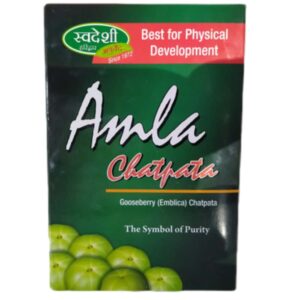In ancient texts of Ayurveda, Amla has been referred to as Amalaki. Its scientific name is “Phyllanthus Emblica”. It is
also known as Indian Gooseberry and is a small, round, pulpy and bright yellow-green fruit. It is, in fact, known as, “divyaushada” (divine medicine) as it has five tastes- sour, bitter, sweet, astringent and pungent which help in the functioning of mind and body.
The healing properties are innumerable as it contains huge amounts of Amla Vitamin C, calcium, phosphorus, iron, protein and fibre. It is the powerhouse of antioxidants and ancient Ayurveda elicits that the consumption of this superfruit prevents the formation of cancer cells.
It can be consumed in many forms-raw, juice, pickle, candy and supplements. Incorporating this fruit into your diet might improve your overall health. It can be grown at home as well. Choose a planting location with deep, rich, well-drained loam and full sun exposure. Although amla grows best in deep, rich soil still it can grow in almost any soil that isn’t extremely alkaline or soggy.
Table of Content
- Synonyms
- Amla Benefits
- Precautions
- Amalaki uses
- How to make amla juice at home
- Frequently Asked Questions
Synonyms
Amalaki, divyaushada, usirikaya, nellika, boamalacca, aonli.
Amla Benefits
Ayurveda strongly recommends amla to improve immunity, boost metabolism and longevity as it possesses incredible medical healing properties. Some of its benefits include:-
1. Amla for Hair
It is strongly recommended for hair fall problems. Its regular intake restricts hair loss as it is rich in carotene, iron and antioxidants. It not only reduces hair loss but also rejuvenates hair follicles, prevents premature greying of hair and clears dandruff.

2. Amla for Skin
It purifies the blood and helps the skin to glow from within. If one is suffering from acne, pimples, blemishes, freckles and/or various skin allergies, usage of amla based face packs or consumption of various amla products help to restore skin health and keep it youthful.
3. Amla for Hair Growth
Amalaki possesses various plant compounds, minerals and vitamins which aid in hair growth. Amla Vitamin C increases the proportion of collagen in the body which adds length and volume to the hair. It also replaces dead cells on the scalp and generates new ones.
4. Amla for Weight Loss
It prevents almost all the causes of obesity such as slow metabolism, fat accumulation at unwanted places, toxic build-up, etc.
5. Diabetes Control
The fibre in Amalaki dissolves quickly in the body and hence slows the rate of absorption of sugar. It also has a positive impact on blood glucose and lipid counts in people with type 2 diabetes.
6. Memory and Brain Health
Amla Vitamin C helps produce a neurotransmitter called norepinephrine that improves brain function. The antioxidants in it can benefit memory by fighting against free radicals that can attack and damage brain cells.
7. Amla helps in treating painful mouth ulcers
It can also cure mouth ulcers with its inflammatory properties. Dilute Amla juice in half a cup of water and gargle.
8. Improves liver function
It contains good amounts of phytochemicals like quercetin, gallic acid which aid in detoxification and in fighting free radicals. This improves liver function, boost vitality and provides energy.
Precautions
Although amla is the “superfruit”, there are certain precautions to be taken:-
- It should not be consumed by people with multiple bleeding disorders as it increases the risk of bleeding and bruising.
- It should be avoided in case of aggravated problems like coughing, nausea, etc.
- An excessive dosage of Amalaki might cause dryness in the skin.
Amalaki Uses
It can be consumed in various forms. It can be used as an ingredient for various products as well.
- It can be eaten as a raw fruit with salt before meals to get relief from hyperacidity.
- It can be consumed in the form of candies or tablets before and after meals for better digestion. You can purchase Swadeshi Amla Candy available at a reasonable price on the website.
- You can purchase products like Dhootapapeshwar Swamala available on the website which have used amalaki as the main ingredient. It will replenish lost vitality and total health.
- You can also go for a regular intake of amla juices, pickles, etc.
- Amla murabba is a good source of instant energy. It contains cardamom which contributes to flavour and digestion.
How to make Amla Juice at home?
Step-1
Step-2
Step-3
Step-4
You can also watch the below video on how to make Amla juice at home:
Frequently asked Questions
How many amlas should be eaten in a day?
How to store amla fruit?
Is amla good for the heart?
Does amla help in wound healing?
Is amla good for pregnant women?
Does amla help in treating fibroids?
What is the best time to eat amla?
Is amla good for patients having kidney related problems?

Riya Katiyar
Hi, I am Riya. I am a person who lives and promotes a healthy lifestyle. According to me, living by certain rules and a routine in life makes it better.
Related Products
-
Nutrition & Supplements
Swadeshi Amla Candy (500g)
Rated 0 out of 5Select optionsApplicable Offers
- Free Shipping on Orders above ₹999
- Extra 5% OFF on Orders above ₹1999 Use Coupon Code: DISCOUNT5
Recent Articles

Kalonji- Black Cumin
Kalonji is a flowering plant native to Southern Europe, Southwest Asia and North Africa. Scientifically, it is referred to as “Nigella Sativa”. These seeds have

Honey
High in beneficial plant compounds and offering several health benefits, honey is a relatively healthy alternative to other sweeteners used in daily life and cuisine

Dalchini – Wooden Rolls
Dalchini or cinnamon are the strips of the inner bark of a tropical evergreen tree. These are pale-brown to tan strips which are generally thin


